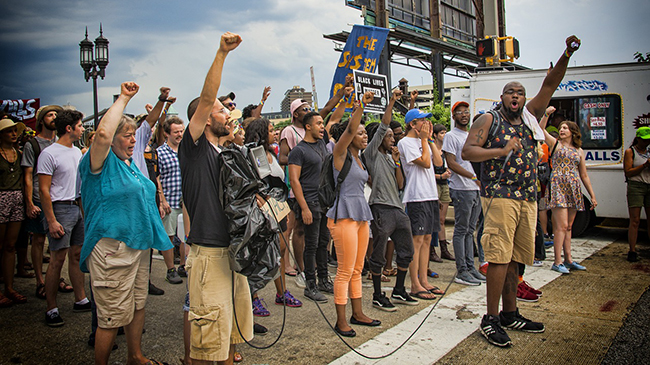
The Black Lives Matter movement has galvanized social protest in 2016.
By Steven Krolak
(NEW ALBANY, Ind.)–The Social Sciences Forum will hold a panel entitled, “Taking a Knee and Taking a Stand: A Discussion of the Black Lives Matter Movement,” on Wed., Oct. 26 from 6–7:30 p.m. in the Third Floor Reading Room of the IU Southeast Library. The panel is free and open to the campus community and the public.
Speakers will be Dr. Elizabeth Gritter, assistant professor of history; Dr. Veronica Medina, assistant professor of sociology; and Dr. Jennifer Ortiz, assistant professor of criminology and criminal justice.
The speakers will discuss such topics as the historical background and causes of the movement, the nature of that movement and recent protests by athletes, entertainers and others.
“The concerns raised by Black Lives Matter may not be real to many of our students, because they haven’t experienced them directly,” Ortiz said “Making those concerns real and tangible might allow students to recognize the very real issues that served as the catalysts for the B.L.M. movement.”
For Ortiz, a light-skinned woman of color, those issues are as simple and as omnipresent as the realization that her color and gender reduce the probability of negative interactions with police.
“Because I am aware of my privilege I can look at black and brown men and women and acknowledge that they are operating within a society that does not afford them the same privilege,” Ortiz said.
Gritter, whose research has focused on the civil rights movement, sees interesting parallels to today’s unfolding conversations.
“The Black Lives Matter movement focuses on police brutality. My research on African Americans in Memphis has revealed a historic pattern of police brutality as well,” Gritter said. “While researching race relations in 1950s Memphis, I learned that some whites considered race relations to be peaceful and harmonious although this was far from the case.”
Gritter sees a broad benefit to the forum, both for her own research and the community.
“I look forward to learning more about the Black Lives Matter movement in a way that will allow me to educate others about it,” Gritter said. “I am also interested in the opportunity to dig more deeply into how it relates to past movements for racial advancement.”
Medina sees Black Lives Matter as a catalyst for the discussion of issues confronting other historically marginalized and disenfranchised groups.
“The power of consciousness-raising that comes from B.L.M. has been a great source of inspiration and empowerment for important civil rights issues of our time,” Medina said. “We see this in protests against the Dakota Access pipeline, in the fight against rape culture, in the push for enacting comprehensive protections for gender expression and sexual identity, and in the demand for humane working conditions for workers of all communities.”
For her part, Ortiz expects the event to fuel the exchange of ideas on campus.
“I think it is vital for all students, especially those who don’t quite understand why B.L.M. participants are so upset, to attend this event, as the information provided will inform their views of the world and allow for critical discussions in the classroom.”
The goals of the Social Sciences Forum are to provide an environment to discuss controversial topics in the news from multiple social sciences perspectives, to educate students and the community on these topics, and to promote the School of Social Sciences and its faculty.


